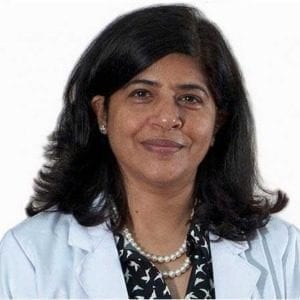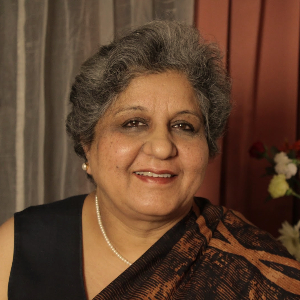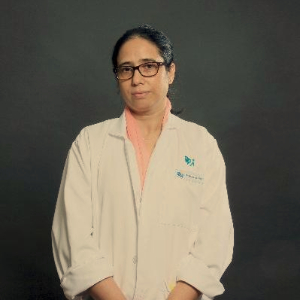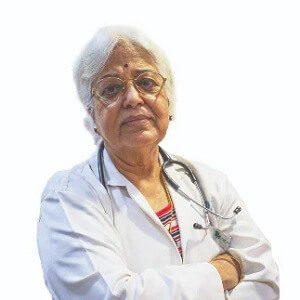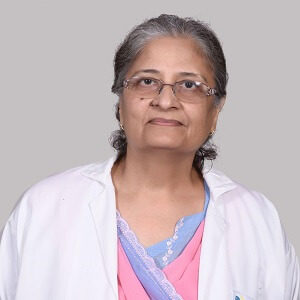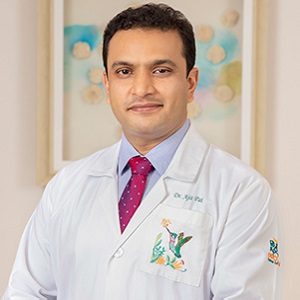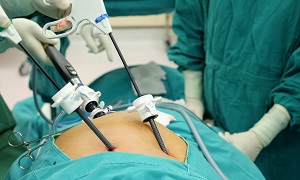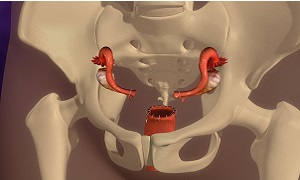Best Endometriosis Treatment Doctors in India.
- Obstetrician & Gynaecologist, Gurugram, India
- Over 26 years’ experience
Profile Highlights:
- Dr. Mukta Kapita has attained expertise in managing high-risk pregnancies, as well as laparoscopic and hysteroscopic surgeries. She also excels in urogynaecological procedures with more than 20 years of experience in this field.
- She has traveled all over the country, and the world, and has been exposed to some of the best equipment and hospitals in this field.
- IVF Specialist & Gynaecologist, New Delhi, India
- Over 30 years’ experience
Profile Highlights:
- Dr. Sonia Malik is a renowned gynecologist and obstetrician in India specializing in IVF and ART.
- Dr. Sonia Malik founded the Southend Fertility and IVF Center with the motive of helping infertile couples have a family, and the clinic is considered one of the best in India.
- She holds an extensive experience of 30+ years in Gynecology, Obstetrics, and Infertility and specializes in various types of ARTs including IVF, ICSI, and IMSI. Dr. Malik has performed over 8000 fertility procedures with around 25 IVF cycles and 20 IUI cycles every month.
- Surgical Oncologist, New Delhi, India
- Over 20 years’ experience
Profile Highlights:
- One of the finest oncologists in India, Dr. Ruqaya Ahmad Mir has been practicing surgical oncology for the past 20 years and is currently functioning as a Senior Consultant, Oncology at Indraprastha Apollo Hospital, New Delhi.
- Dr. Ruqaya Mir is known for her outstanding performance in some of the advanced surgical techniques which include Uterus and Ovary and Limb Conservation surgery and Cytoreductive surgery and Hyperthermic Intraperitoneal chemotherapy for advanced colorectal and recurrent ovarian malignancies.
- She is also a well trained Robotic Surgeon practicing implementation of minimal invasion in surgical oncology.
- Obstetrician & Gynaecologist, New Delhi, India
- Over 55 years’ experience
Profile Highlights:
- Dr. Shakti Bhan Khanna is a well-known obstetrician and gynecologist in New Delhi. She has over five decades of work expertise in academics and this arena.
- A specialized ‘Khanna’s Sling Operation’ technique for Vault Prolapse developed from her Obstetrics and Gynecology experience has received immense success.
- Dr. Khanna is working as a senior consultant at Indraprastha Apollo Hospital and Apollo Cradle & Children’s Hospital since December 1995.
- Dr. Khanna specializes in complex reproductive treatments, gynecological laparoscopy, gyne-endocrinological treatment, infertility and high-risk pregnancies, and pelvic reconstructive surgery.
- Dr. Khanna has delivered many orations and received various felicitations.
- Obstetrician & Gynaecologist, New Delhi, India
- Over 25 years’ experience
Profile Highlights:
- Dr. Usha Kumar is a veteran Gynaecologist and Obstetrician with over 25 years of proficient experience.
- Having performed over 10,000 surgeries so far, Dr. Usha has also managed to establish herself as a top-notch gynecologist in India.
- Obstetrician & Gynaecologist, New Delhi, India
- Over 40 years’ experience
Profile Highlights:
- Dr. Harmeet Malhotra is one of the best gynecologists in India to consult all major and complex gynecological surgeries, uterine bleeding, and cervical cerclage; in addition to the women’s general health checkups.
- Dr. Malhotra specializes in vaginal, abdominal, and Laparoscopic surgeries, as well as Hysteroscopy. She had her first Hysteroscopic surgery at Apollo Hospitals in New Delhi.
- Surgical Oncologist, New Delhi, India
- Over 40 years’ experience
Profile Highlights:
- Dr. Ramesh Sarin is one of the best surgical oncologists in India, with a mammoth experience of 49 years.
- Furthermore, the veteran oncologist focuses on managing breast cancer and related disorders like sentinel node biopsy.
- She is also interested in Phyaryngeal Cancer, Uterine Cancer, Bladder Cancer, Cervical Cancer, Liver Cancer, Fallopian Tube Cancer, Bone Cancer, Lung Cancer, Colon and Rectal Cancer, Lymphedema, and Brain Cancer.
- Surgical Oncologist, Chennai, India
- Over 15 years’ experience
Profile Highlights:
- Dr. Ajit Pai is one of the best Oncologists in the country with ‘n’ number of prizes and awards on his list of achievements.
- He has done specialized courses in the treatment and management of GI cancers, gynecological cancers, and cancer of food pipes.
- Surgical Oncologist, New Delhi, India
- Over 35 years’ experience
Profile Highlights:
- Dr. Feroz Pasha is one of the best oncology surgeons in Delhi. His primary interest lies in Uro- and Gynaeoncology procedures.
- During his experience in Surgical Oncology, Dr. Pasha specialized in Port insertion and tumor ablation with radiofrequency.
Best Hospitals India for Endometriosis Treatment
Endometriosis Surgery
Endometriosis is an ailment that causes tissue growing normally on the inside lining of the uterus to implant in other parts of the abdomen. The misplaced tissue can lead to symptoms like pain which can occur during a period, bowel movements or sexual intercourse. Having endometriosis also makes it harder for a woman to get pregnant.
Though surgery should be able to relieve your pain as well as improve your odds of conceiving, it can be difficult to know what to expect from surgery.
Purpose
Generally, two main treatments are used by doctors for endometriosis, i.e. medicine and surgery. Surgery is never considered as a first response. It is only considered when medications fail to provide you the desired results.
Surgery is also considered if you are trying to get pregnant but have not been successful. The odds of getting pregnant usually increase after the endometriosis tissue is removed.
It is important to note that you need to discuss properly with your doctor if you are considering surgery, as it is a big decision, especially if you are considering a hysterectomy, which can remove your uterus and possibly your ovaries as well. Without ovaries and a uterus, pregnancy is not possible.
Types
Two main types of surgery are used for treating endometriosis:
- Conservative surgery is for removing as much of the endometriosis tissue as much as possible. But this procedure can preserve your reproductive organs, i.e. ovaries and uterus. This procedure is generally done through small incisions, known as laparoscopy. Laparoscopy can be used for diagnosis as well.
- Hysterectomy is for treating more severe endometriosis. The surgeon first removes your uterus, as well as possibly your cervix and ovaries. If you undergo this procedure, pregnancy will no longer be possible.
Preparation
Your doctors might ask you to avoid certain kinds of medications, before your surgery. You also need to avoid smoking for as long as possible, before and after surgery.
On the day of the surgery, your doctor will advise you not to have any food or liquid for at least 8 hours before the procedure.
Your doctor might also ask you to take a laxative to empty your bowels completely before the surgery.
Procedure
Laparoscopy
The most common procedure for diagnosing and removing mild to moderate endometriosis is laparoscopy.
First, you will be given anesthesia, so that you will not feel any pain. Then your doctor will fill your belly with gas, as this will allow your surgeon to see inside your abdomen.
Next, a few small incisions will be made near your belly button. A lighted scope will be inserted into one of these incisions.
Surgical instruments are going to be inserted into one of these openings.
Using knife, heat or laser, your doctor will be removing as much of the endometriosis tissue as possible, from your organs such as the bladder, ovaries, fallopian tubes and rectum. A sample of this tissue might be sent to the lab for testing. The surgeon will also remove any scar tissue in these organs. At last, your incisions will be closed up as well.
In most cases, a patient should be able to return home the same day of the surgery.
Hysterectomy
Vaginally
The surgeon will first make an incision in your lower pelvis and remove the uterus and other reproductive organs through the incision.
Hysterectomy
The surgeon removes your uterus and your cervix through the vagina, without making any incision.
Laparoscopically
Few small incisions are made in your abdomen. Through these incisions, your surgeon will be removing your uterus and possibly your cervix.
Aftercare & recovery
You should recover faster after laparoscopic surgery than after an open hysterectomy. For the first few days, your activities might be limited after the procedure. Discuss with your surgeon when you should be able to go back to driving, working or exercise. Generally, a full recovery from a hysterectomy can take four to six weeks.
If you undergo a hysterectomy, you will not get a period anymore.
Although surgery can help in relieving pain and laparoscopic surgery can help you get pregnant. It doesn’t necessarily cure endometriosis, even if you undergo a hysterectomy. You might still experience symptoms if you have any endometriosis tissue left in your abdomen.
In around 20 to 40 percent of women, symptoms generally come back within five years. The remaining tissue can continue to grow, and it is not possible to remove every cell of misplaced tissue.
Risks
Although endometriosis surgery is generally safe, like all surgeries it may have few risks, which can include bleeding, infection, damage to any nearby nerves or blood vessels, as well as an abnormal connection between two organs in the abdomen.
If you experience any symptoms such as fever over 38 ° Celsius, redness or swelling at the incision site, heavy bleeding in your vagina or the incision site, or severe pain, then you need to contact your doctor.

